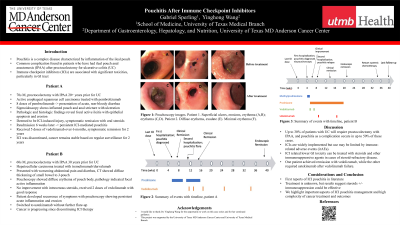Sunday Poster Session
Category: Colon
P0280 - Pouchitis After Immune Checkpoint Inhibitors
Sunday, October 22, 2023
3:30 PM - 7:00 PM PT
Location: Exhibit Hall

Has Audio

Gabriel Sperling, BS
University of Texas Medical Branch School of Medicine
Galveston, TX
Presenting Author(s)
Gabriel Sperling, BS1, Yinghong Wang, MD2
1University of Texas Medical Branch School of Medicine, Galveston, TX; 2University of Texas MD Anderson Cancer Center, Houston, TX
Introduction: Pouchitis is a complex disease characterized by inflammation of the ileal pouch and is a common complication found in patients who have had proctocolectomy with ileal pouch-anal anastomosis (PC-IPAA) for ulcerative colitis (UC). ICIs are a revolutionary anticancer treatment but are associated with significant systemic toxicities.
Case Description/Methods: A: A male patient in his 70s who underwent PC-IPAA was receiving pembrolizumab for esophageal carcinoma. After developing acute onset diarrhea, sigmoidoscopy revealed an inflamed pouch and anal stricture with superficial ulceration. Additional findings included focal active ileitis with epithelial apoptosis and erosion. In the context of pembrolizumab use, these non-specific findings were deemed to be ICI-induced injury that responded completely to steroids. Patient was later readmitted for hematochezia and found to have persistent pouchitis. Vedolizumab was started, and repeat pouchoscopy showed marked improvement with sustained symptom remission. ICI was discontinued due to multisystem toxicities but his cancer remains stable.
B: A male patient in his 60s who underwent PC-IPAA has hepatocellular carcinoma treated with tremelimumab/durvalumab. After presenting with acute abdominal pain and diarrhea, CT scan revealed diffuse thickening of the small bowel to J-pouch, and pouchoscopy revealed diffuse erythema of the pouch. Patient did not symptomatically respond to steroids, so he received 2 doses of vedolizumab with good response. Aggressive diarrhea recurred with pouchoscopy revealing persistent acute inflammation, so he switched to ustekinumab without further flares. However, his cancer is progressing since discontinuation of ICI, and discussion is ongoing about further treatment.
Discussion: 25-30% of patients with UC will require proctocolectomy with IPAA, with complications such as pouchitis occurring in up to 50%. ICIs are a widely implemented, potent anti-neoplastic therapy, though use may be limited by the development of irAEs, particularly within the GI tract. Treatment for lower GI toxicity includes steroids followed by immunosuppressive agents, which was the same approach taken for our patients given overlapping etiology and luminal distribution. 1 patient had a good response with vedolizumab, while the other required ustekinumab after vedolizumab failure. In summary, we present the first reports of post-ICI pouchitis, highlighting important aspects of pouchitis management as well as high complexity of cancer treatment and outcomes.

Disclosures:
Gabriel Sperling, BS1, Yinghong Wang, MD2. P0280 - Pouchitis After Immune Checkpoint Inhibitors, ACG 2023 Annual Scientific Meeting Abstracts. Vancouver, BC, Canada: American College of Gastroenterology.
1University of Texas Medical Branch School of Medicine, Galveston, TX; 2University of Texas MD Anderson Cancer Center, Houston, TX
Introduction: Pouchitis is a complex disease characterized by inflammation of the ileal pouch and is a common complication found in patients who have had proctocolectomy with ileal pouch-anal anastomosis (PC-IPAA) for ulcerative colitis (UC). ICIs are a revolutionary anticancer treatment but are associated with significant systemic toxicities.
Case Description/Methods: A: A male patient in his 70s who underwent PC-IPAA was receiving pembrolizumab for esophageal carcinoma. After developing acute onset diarrhea, sigmoidoscopy revealed an inflamed pouch and anal stricture with superficial ulceration. Additional findings included focal active ileitis with epithelial apoptosis and erosion. In the context of pembrolizumab use, these non-specific findings were deemed to be ICI-induced injury that responded completely to steroids. Patient was later readmitted for hematochezia and found to have persistent pouchitis. Vedolizumab was started, and repeat pouchoscopy showed marked improvement with sustained symptom remission. ICI was discontinued due to multisystem toxicities but his cancer remains stable.
B: A male patient in his 60s who underwent PC-IPAA has hepatocellular carcinoma treated with tremelimumab/durvalumab. After presenting with acute abdominal pain and diarrhea, CT scan revealed diffuse thickening of the small bowel to J-pouch, and pouchoscopy revealed diffuse erythema of the pouch. Patient did not symptomatically respond to steroids, so he received 2 doses of vedolizumab with good response. Aggressive diarrhea recurred with pouchoscopy revealing persistent acute inflammation, so he switched to ustekinumab without further flares. However, his cancer is progressing since discontinuation of ICI, and discussion is ongoing about further treatment.
Discussion: 25-30% of patients with UC will require proctocolectomy with IPAA, with complications such as pouchitis occurring in up to 50%. ICIs are a widely implemented, potent anti-neoplastic therapy, though use may be limited by the development of irAEs, particularly within the GI tract. Treatment for lower GI toxicity includes steroids followed by immunosuppressive agents, which was the same approach taken for our patients given overlapping etiology and luminal distribution. 1 patient had a good response with vedolizumab, while the other required ustekinumab after vedolizumab failure. In summary, we present the first reports of post-ICI pouchitis, highlighting important aspects of pouchitis management as well as high complexity of cancer treatment and outcomes.

Figure: Patient disease course.
Disclosures:
Gabriel Sperling indicated no relevant financial relationships.
Yinghong Wang: ilyapharma – Consultant. IOTA – Consultant. Janssen – Consultant. MabQuest – Advisory Committee/Board Member. Sorriso – Consultant. Tillotts – Consultant.
Gabriel Sperling, BS1, Yinghong Wang, MD2. P0280 - Pouchitis After Immune Checkpoint Inhibitors, ACG 2023 Annual Scientific Meeting Abstracts. Vancouver, BC, Canada: American College of Gastroenterology.

